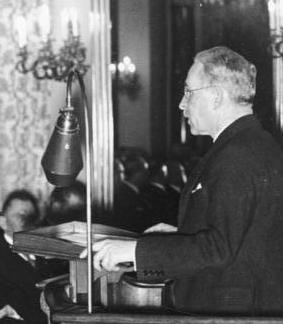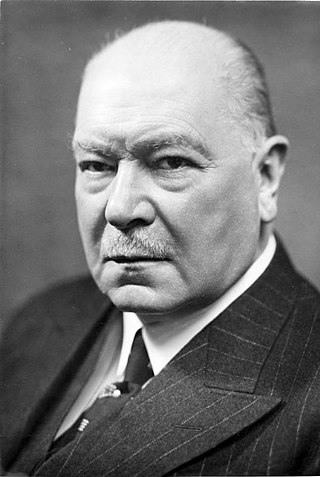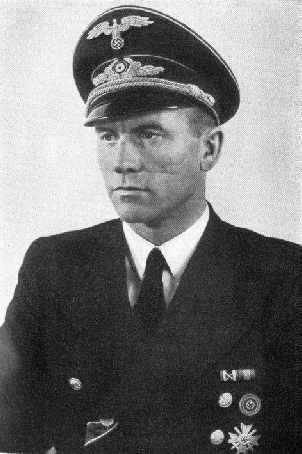
The Hitler cabinet was the government of Nazi Germany between 30 January 1933 and 30 April 1945 upon the appointment of Adolf Hitler as Chancellor of the German Reich by President Paul von Hindenburg. It was contrived by the national conservative politician Franz von Papen, who reserved the office of the Vice-Chancellor for himself. Originally, Hitler's first cabinet was called the Reich Cabinet of National Salvation, which was a coalition of the Nazi Party (NSDAP) and the national conservative German National People's Party (DNVP). The Hitler cabinet lasted until his suicide during the defeat of Nazi Germany. Hitler's cabinet was succeeded by the short-lived Goebbels cabinet, with Karl Dönitz appointed by Hitler as the new Reichspräsident.

The Deutsche Reichsbahn, also known as the German National Railway, the German State Railway, German Reich Railway, and the German Imperial Railway, was the German national railway system created after the end of World War I from the regional railways of the individual states of the German Empire. The Deutsche Reichsbahn has been described as "the largest enterprise in the capitalist world in the years between 1920 and 1932"; nevertheless, its importance "arises primarily from the fact that the Reichsbahn was at the center of events in a period of great turmoil in German history".
Reichspost was the name of the postal service of Germany from 1866 to 1945.

Herbert Friedrich Wilhelm Backe was a German politician and SS Senior group leader (SS-Obergruppenführer) in Nazi Germany who served as State Secretary and Minister in the Reich Ministry of Food and Agriculture. He was a doctrinaire racial ideologue, a long-time associate of Richard Walther Darré and a personal friend of Reinhard Heydrich. He developed and implemented the Operation Hunger that envisioned death by starvation of millions of Slavic and Jewish "useless eaters" following Operation Barbarossa, the 1941 invasion of the Soviet Union.

Johannes Popitz was a Prussian lawyer, finance minister and a member of the German Resistance against the government of Nazi Germany. He was the father of Heinrich Popitz, an important German sociologist.

Erich Klausener was a German Catholic politician and Catholic martyr in the "Night of the Long Knives", a purge that took place in Nazi Germany from 30 June to 2 July 1934, when the Nazi regime carried out a series of political murders.

Peter Paul Freiherr von Eltz-Rübenach was Reich Postal Minister (Reichspostminister) and Reich Minister of Transport (Reichsminister für Verkehr) of Germany between 1932 and 1937.

The government of Nazi Germany was a totalitarian dictatorship governed by Adolf Hitler and the Nazi Party according to the Führerprinzip. Nazi Germany was established in January 1933 with the appointment of Adolf Hitler as Chancellor of Germany, followed by suspension of basic rights with the Reichstag Fire Decree and the Enabling Act which gave Hitler's regime the power to pass and enforce laws without the involvement of the Reichstag or German president, and de facto ended with Germany's surrender in World War II on 8 May 1945 and de jure ended with the Berlin Declaration on 5 June 1945.

Wilhelm Ohnesorge was a German politician in the Third Reich who sat in the Hitler Cabinet. From 1937 to 1945, he was the Reichsminister of the Reich Postal Ministry, the German postal service, having succeeded Paul Freiherr von Eltz-Rübenach. Along with his ministerial duties, Ohnesorge also significantly delved into research relating to propagation and promotion of the Nazi Party through the radio, and the development of a proposed German atomic bomb.

Julius Heinrich Dorpmueller was general manager of Deutsche Reichsbahn-Gesellschaft from 1926 to 1945, a Nazi politician and the Reich Minister for Transport from 1937 to 1945.

Albert Ganzenmüller was a German Nazi and, as the State Secretary at the Reich Transport Ministry (Reichsverkehrsministerium), was involved in the deportation of German Jews.
Werner Willikens was a German politician with the Nazi Party who largely served in agricultural administration. He was also a general officer in the SS. His phrase "working towards the Führer", which he used in a 1934 speech, has become a common description of Nazi bureaucracy.

Rudolf Oeser was a German journalist and liberal politician. From 1922 to 1924 he was a member of several governments of the Weimar Republic, serving as Minister of the Interior and Minister of Transport.

The Reich Ministry of Transport was a cabinet-level agency of the German government from 1919 until 1945, operating during the Weimar Republic and Nazi Germany. Formed from the Prussian Ministry of Public Works after the end of World War I, the RVM was in charge of regulating German railways, roadways, waterways, and the construction industry - a kind of infrastructure agency in today's understanding. In the 1920s, the Ministry's involvement in the rail sector was limited to administrative and technical supervisory functions. The National Railway was initially organized as an independent state-owned company to guarantee that Germany paid war reparations according to the provisions of the 1924 Dawes Plan.

Artur Görlitzer, sometimes Anglicized as Arthur Goerlitzer, was a Nazi Party official who served as the Deputy Gauleiter of Gau Berlin from 1933 to 1943. He was also a member of the German Reichstag, and committed suicide at the close of the Second World War in Europe.

Kuno Heinrich Franziskus Maria Hubertus Reichsfreiherr und Edler Herr von und zu Eltz-Rübenach was a member of the Reichstag of Nazi Germany and a SS-Brigadeführer.
Wilhelm Otto Max Kleinmann was a German railway official and politician. From 1933 to 1942 he was Deputy General Director of the Deutsche Reichsbahn and, from 1938 to 1942, a State Secretary in the Reich Ministry of Transport. At the end of the Second World War, he was captured by Soviet forces and was declared to have died in captivity.
Bruno Wilhelm Heinrich Claußen was a German lawyer and civil servant who was the Prussian State Secretary for Economics and Labor in the first year of the Third Reich. After leaving public service, he became a successful business executive. He went missing during the final days of the Second World War.
Gustav Wagemann was a German lawyer and judge who worked in the Prussian Ministry of Justice under the German Empire, the Weimar Republic and Nazi Germany. He died in an airplane accident in December 1933.













